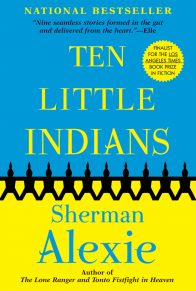At almost one o’clock I entered the lobby of the building where I worked and turned toward the escalators, carrying a black Penguin paperback and a small white CVS bag, its receipt stapled over the top. The escalators rose toward the mezzanine, where my office was. They were the freestanding kind: a pair of integral signs swooping upward between the two floors they served without struts or piers to bear any intermediate weight. On sunny days like this one, a temporary, steeper escalator of daylight, formed by intersections of the lobby’s towering volumes of marble and glass, met the real escalators just above their middle point, spreading into a needly area of shine where it fell against their brushed-steel side-panels, and adding long glossy highlights to each of the black rubber handrails which wavered slightly as the handrails slid on their tracks, like the radians of black luster that ride the undulating outer edge of an LP.
When I drew close to the up escalator, I involuntarily transferred my paperback and CVS bag to my left hand, so that I could take the handrail with my right, according to habit. The bag made a little paper-rattling sound, and when I looked down at it, I discovered that I was unable for a second to remember what was inside, my recollection snagged on the stapled receipt. But of course that was one of the principal reasons you needed little bags, I thought: they kept your purchases private, while signaling to the world that you led a busy, rich life, full of pressing errands run. Earlier that lunch hour, I had visited a Papa Gino’s, a chain I rarely ate at, to buy a half-pint of milk to go along with a cookie I had bought unexpectedly from a failing franchise, attracted by the notion of spending a few minutes in the plaza in front of my building eating a dessert I should have outgrown and reading my paperback. I paid for the carton of milk, and then the girl (her name tag said “Donna”) hesitated, sensing that some component of the transaction was missing: she said, “Do you want a straw?” I hesitated in turn—did I? My interest in straws for drinking anything besides milkshakes had fallen off some years before, probably peaking out the year that all the major straw vendors switched from paper to plastic straws, and we entered that uncomfortable era of the floating straw;1 although I did still like plastic elbow straws, whose pleated necks resisted bending in a way that was very similar to the tiny seizeups your finger joints will undergo if you hold them in the same position for a little while.
So when Donna asked if I would like a straw to accompany my half-pint of milk, I smiled at her and said, “No thanks. But maybe I’d like a little bag.” She said, “Oh! Sorry,” and hurriedly reached under the counter for it, touchingly flustered, thinking she had goofed. She was quite new; you could tell by the way she opened the bag: three anemone splayings of her fingers inside it, the slowest way. I thanked her and left, and then I began to wonder: Why had I requested a bag to hold a simple half-pint of milk? It wasn’t simply out of some abstract need for propriety, a wish to shield the nature of my purchase from the public eye—although this was often a powerful motive, and not to be ridiculed. Small mom and pop shopkeepers, who understood these things, instinctively shrouded whatever solo item you bought—a box of pasta shells, a quart of milk, a pan of Jiffy Pop, a loaf of bread—in a bag: food meant to be eaten indoors, they felt, should be seen only indoors. But even after ringing up things like cigarettes or ice cream bars, obviously meant for ambulatory consumption, they often prompted, “Little bag?” “Small bag?” “Little bag for that?” Bagging evidently was used to mark the exact point at which title to the ice cream bar passed to the buyer. When I was in high school I used to unsettle these proprietors, as they automatically reached for a bag for my quart of milk, by raising a palm and saying officiously, “I don’t need a bag, thanks.” I would leave holding the quart coolly in one hand, as if it were a big reference book I had to consult so often that it bored me.
Why had I intentionally snubbed their convention, when I had loved bags since I was very little and had learned how to refold the large thick ones from the supermarket by pulling the creases taut and then tapping along the infolding center of each side until the bag began to hunch forward on itself, as if wounded, until it lay flat again? I might have defended my snub at the time by saying something about unnecessary waste, landfills, etc. But the real reason was that by then I had become a steady consumer of magazines featuring color shots of naked women, which I bought for the most part not at the mom-and-pop stores but at the newer and more anonymous convenience stores, distributing my purchases among several in the area. And at these stores, the guy at the register would sometimes cruelly, mock-innocently warp the “Little bag?” convention by asking, “You need a bag for that?”—forcing me either to concede this need with a nod, or to be tough and say no and roll up the unbagged nude magazine and clamp it in my bicycle rack so that only the giveaway cigarette ad on the back cover showed—”Carlton Is Lowest.”
Hence the fact that I often said no to a bag for a quart of milk at the mom-and-pop store during that period was a way of demonstrating to anyone who might have been following my movements that at least at that moment, exiting that store, I had nothing to hide; that I did make typical, vice-free family purchases from time to time. And now I was asking for a little bag for my half-pint of milk from Donna in order, finally, to clean away the bewilderment I had caused those moms and pops, to submit happily to the convention, even to pass it on to someone who had not yet quite learned it at Papa Gino’s.
But there was a simpler, less anthropological reason I had specifically asked Donna for the bag, a reason I hadn’t quite isolated in that first moment of analysis on the sidewalk afterward, but which I now perceived, walking toward the escalator to the mezzanine and looking at the stapled CVS bag I had just transferred from one hand to the other. It seemed that I always liked to have one hand free when I was walking, even when I had several things to carry: I liked to be able to slap my hand fondly down on the top of a green mailmen-only mailbox, or bounce my fist lightly against the steel support for the traffic lights, both because the pleasure of touching these cold, dusty surfaces with the springy muscle on the side of my palm was intrinsically good, and because I liked other people to see me as a guy in a tie yet carefree and casual enough to be doing what kids do when they drag a stick over the black uprights of a cast-iron fence. I especially liked doing one thing: I liked walking past a parking meter so close that it seemed as if my hand would slam into it, and at the last minute lifting my arm out just enough so that the meter passed underneath my armpit. All of these actions depended on a free hand; and at Papa Gino’s I already was holding the Penguin paperback, the CVS bag, and the cookie bag. It might have been possible to hold the blocky shape of the half-pint of milk against the paperback, and the tops of the slim cookie bag and the CVS bag against the other side of the paperback, in order to keep one hand free, but my fingers would have had to maintain this awkward grasp, building cell walls in earnest, for several blocks until I got to my building. A bag for the milk allowed for a more graceful solution: I could scroll the tops of the cookie bag, the CVS bag, and the milk bag as one into my curled fingers, as if I were taking a small child on a walk. (A straw poking out of the top of the milk bag would have interfered with this scrolling—lucky I had refused it!) Then I could slide the paperback into the space between the scroll of bag paper and my palm. And this is what I had in fact done. At first the Papa Gino’s bag was stiff, but very soon my walking softened the paper a little, although I never got it to the state of utter silence and flannel softness that a bag will attain when you carry it around all day, its hand-held curl so finely wrinkled and formed to your fingers by the time you get home that you hesitate to unroll it.
It was only just now, near the base of the escalator, as I watched my left hand automatically take hold of the paperback and the CVS bag together, that I consolidated the tiny understanding I had almost had fifteen minutes before. Then it had not been tagged as knowledge to be held for later retrieval, and I would have forgotten it completely had it not been for the sight of the CVS bag, similar enough to the milk-carton bag to trigger vibratiuncles of comparison. Under microscopy, even insignificant perceptions like this one are almost always revealed to be more incremental than you later are tempted to present them as being. It would have been less cumbersome, in the account I am giving here of a specific lunch hour several years ago, to have pretended that the bag thought had come to me complete and “all at once” at the foot of the up escalator, but the truth was that it was only the latest in a fairly long sequence of partially forgotten, inarticulable experiences, finally now reaching a point that I paid attention to it for the first time.
In the stapled CVS bag was a pair of new shoelaces.













